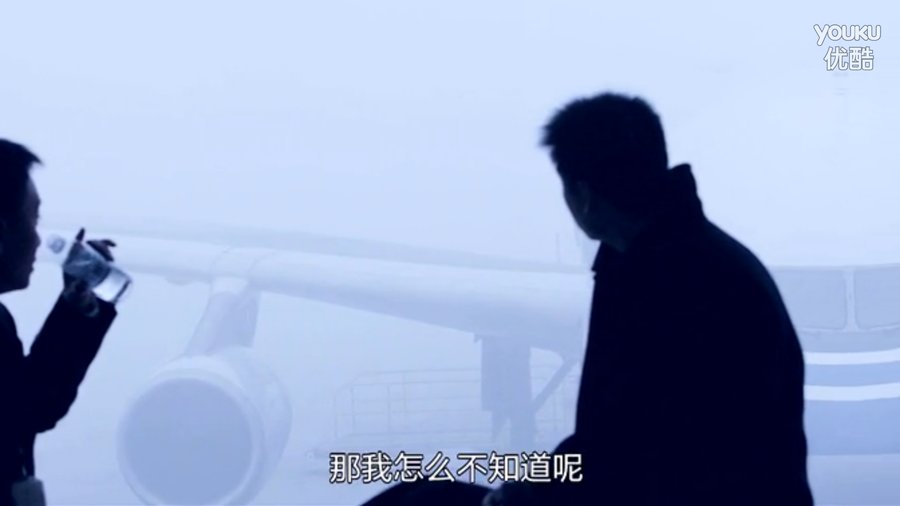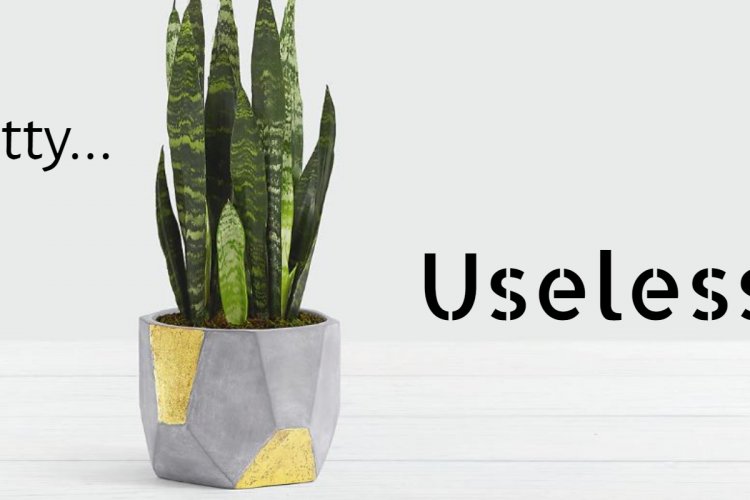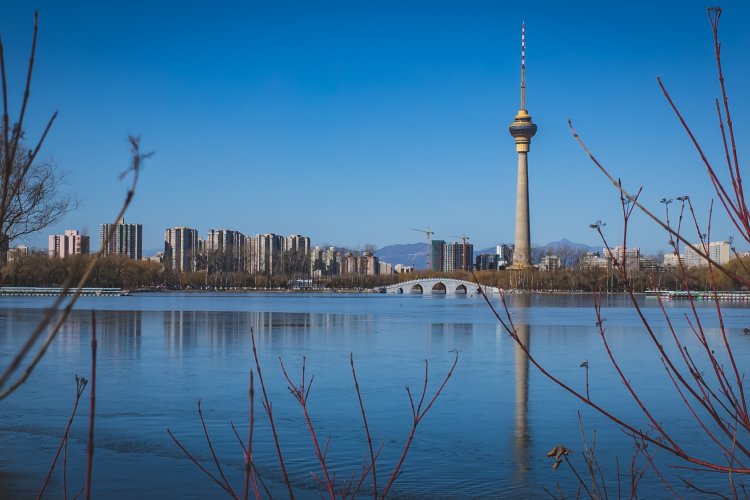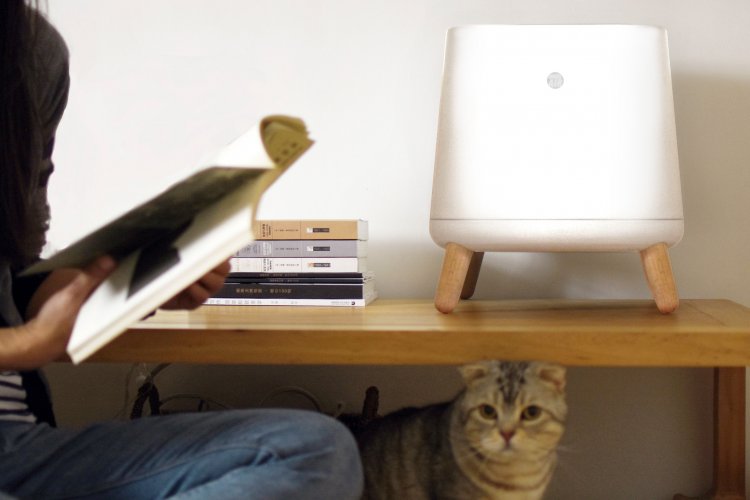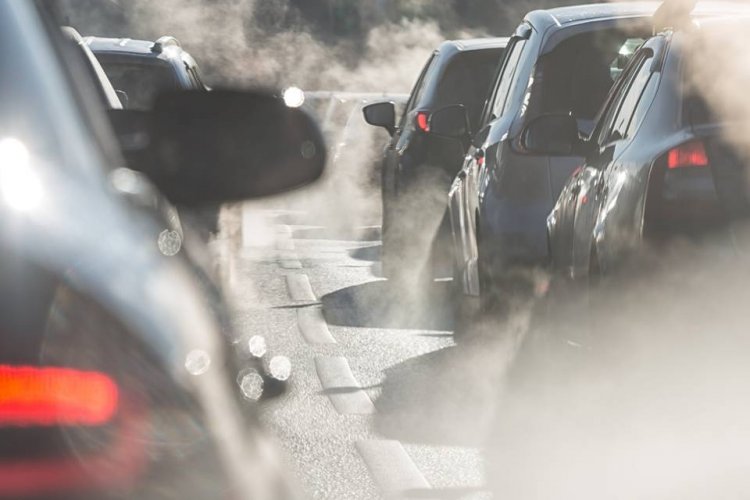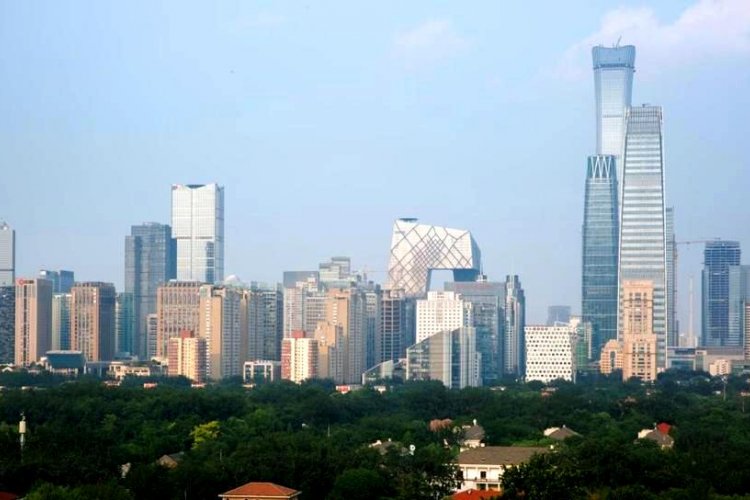well, the local versions of the documentary have now all been scrubbed from the internet, see update here
Where to Watch English-Subtitled Version of Chai Jing's Pollution Documentary 'Under the Dome'
[Update 3/11: Chinese news magazine Caixin is hosting the film locally. Click here.
[Update 3/7: local hosting of this documentary has now been scrubbed from the internet, see update here]
Call it China's An Inconvenient Truth. Former China Central Television reporter Chai Jing's documentary has racked up millions of views on video site Youku since its release over the weekend – and now a version with English subtitles is out.
The one-hour-and-45-minute look at air pollution in China has sparked a new debate about health and the environment. Part TED talk, part interview, part investigative report, Chai became interested in the issue when her daughter was diagnosed with a tumor – before she was even born.
“Before, I never paid attention to pollution. Wherever I went, I never wore a mask,” Chai told The Wall Street Journal in an interview.
This is definitely not a popcorn movie. Expect footage of dead fish in rivers, factories belching smoke, and scenes in hospitals with patients suffering from cancer and other maladies.
One early interview is heartbreaking: Chai, who was previously one of China's top investigative reporters, asks a young girl if she's ever seen white clouds. "Never," the girl replies.
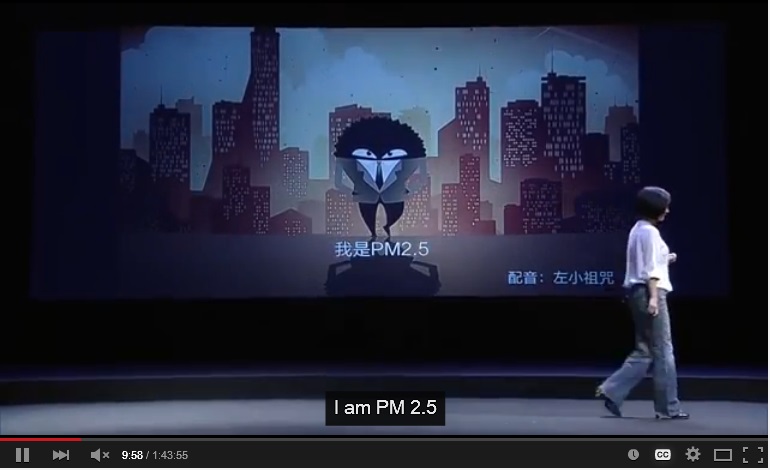
For the moment, the documentary is only available in Chinese on Youku, but a version with English subtitles is now available on YouTube, see the link below. These are considered "working subtitles," so bear with them if they're not perfect.
Watch Under the Dome on Youku or on YouTube.
Photo: Youku/the Beijinger
Related stories :
Comments
New comments are displayed first.Wonderful quotes:
In the war between human beings and air pollution, this is how history will be made: When millions of every day people, stand up one day and say "No. I'm not satisfied. I don't want to wait. I will not sit back. I will stand up and do something. Right now, right here, right in this moment, in this life "
Tens of thousands of lives are being nurtured and born. The rivers, the sky and the earth should belong to them. We don't have the right to only consume without proper control, we don't have the right to complain without making efforts. We have the full responsibility to prove to them that a world enlightened by energy can also be beautiful.
...One day in the future, I'll leave this world, but my child will still be living in it. Then this world matters to me. So I gaze at it the way I gaze at you, so I protect it the way I protect you.
For those that don't have time or the patience to watch the full length of Chai Jing's filme, here is an "English Language Translation of Introductory and Concluding Excerpts" that was posted on Upworthy
CHAI JING: This is the PM [Particulate Matter] 2.5 index chart of Beijing in January, 2013. There were 25 smoggy days in that month, I was in Beijing at that time.
I read the chart again and again, trying to recall how I felt about the weather that year, but I didn't remember much. Many said that the hazy weather was only some temporary meteorological problem, so I didn't take it seriously. I made four business trips to four other provinces in that month: Shaanxi, Henan, Jiangxi and Zhejiang.
I looked at videos and looked at sky in them. It felt like smoggy weather had swept across China — 25 provinces, many cities and a total population of 600 million people. But when I was living under such conditions, I was not even aware of it— I just had a sore throat. The night I was in Xi'an, I kept coughing and could not sleep, so I cut a lemon and put it by my Pillow.
When I went back to Beijing, I found I was pregnant.
This was the first time I saw her. My instincts told me that it would be a girl.
[Approximate 1:00 minute mark]
The moment I heard her heart beating, I did not expect anything from her. I just hoped that she would be healthy. However, she was diagnosed with a tumor and need to undergo a surgery as a new-born baby.
Before giving her anesthesia, the doctor told me it's possible my little girl may not wake up again because she was too young and fragile to make it through. And he told me to be prepared. I did not even have a chance to give her a hug before she was taken away [for surgery].
Later a nurse put a little toy bear in my hand. It was meant for a newborn baby, but she used it to console me.
When I saw my daughter again, she was still in a coma. The doctor told me that the surgery was very successful. But I need to forgive him for one thing: the baby girl was too chubby, so they had to inject the needle multiple times before they could find her vein.
[Approximate 2:00 minute mark]
Then I placed the little hand full of needle eyes on my face and kept calling her name until she opened her eyes and looked at me. I'm a very lucky person.
Later I quit my job to take care of my daughter. As long as our family is safe and sound, I'm satisfied. But on my way home I started to feel scared. That smoky smell filled the air. I covered her nose with a handkerchief, but I was silly to do so because that made her breathe in even more polluted air.
Before this happened, I was never scared of the air pollution, I never wore a mask wherever I went, but now you have a little infant in your arms, you need to take care of her when she breaths, eats or drinks. That's when you are scared.
The hazy weather at the end of 2013 lasted for about two months, it made me realize that that was not and could not be accidental, and it was impossible to see that it would go away anytime soon.
[Approximate 3:00 minute mark]
The sky was like when I was in Shanxi ten years ago.
[ONSCREEN: "2004 footage"]
[The following is a montage of earlier footage from Ms. Jing's reporting]
QUESTION: Is every day like this?
ANSWER: Every day, every year is like this. The past three years have been like this. Every day.
Many chemicals filled in the air, such as benzol, it's a carcinogen. It stays in the body and when the accumulation of chemicals gets to certain level, it could cause cancer.
[ONSCREEN: Shanxi Province: 88.4% of rivers were polluted; 62% of fracture surface lost functions]
QUESTION: Do you still think this is a river?
ANSWER: No, it's not a river, it's sewage, wastewater. Benzol exceeds standard benchmarks by 290 times annually.
Trees died. Look at the dead tree there.
[INTERVIEWS TODDLER GIRL]
JING: Have you ever seen real star?
GIRL: No.
JING: Have you seen blue?
GIRL: A little blue in the sky.
JING: Have you seen the clouds?
GIRL: No.
[Approximate 4:00 minute mark]
When I was interviewing this little girl back in 2004, I could not imagine what this girl described would become the world that my daughter will be living in. This is Beijing in 2014, only when the weather is good enough, I take her out.
But how often do we have those good days? Pollution days were 175 in one year, which means half of the time in that year I had to let her stay indoors, like a prisoner.
Ten years ago, the head of environmental protection bureau said to me: Xiaoyi is the reflection of Shanxi province, and Shanxi is the reflection of China. [NOTE: Xiaoyi is one of the most polluted cities in Shanxi.]
In just ten years, I witnessed that prediction become reality.
On March 4, 2014, 46 photographers recorded 40 continuous days of weather through their lenses;
Tianjin: polluted days in 2014: 197 days
Shenyang: polluted days in 2014: 152 days
Chendu: polluted days in 2014: 125 days
Lanzhou: polluted days in 2014: 112 days
Shijiazhuang: polluted days in 2014: 264 days
I watched a TV show once, called "Under the Dome." It tells a story that all of a sudden a dome fall in one small town and sealed everything, nobody could escape from it. But one day I realized that we are living under such a dome.
When I wake up and see my daughter knocking on the glass window, trying to tell me that she wants to go out. I know sooner or later, she will ask me 'Mom, what's that thing outside? Why do you keep me indoors? Will that thing hurt me?'
In that year, all I did was to giving her the answer. What is haze? Where did it come from? What shall we do?
What is haze?
[Approximate 6:00 minute mark]
Sometimes I want to turn off the light and see what that is. They are the particles less than 2.5 micrometers in diameter. They can reflect much of the light, so we see a world with low visibility. But I can never see those pollutants, because the smallest pollutants we can see are 20 times bigger than that. In other words, this is a war where you can't really see where your enemy is.
There is only one way to do it.
This is a sampling instrument for PM2.5. I can place a clean sample film into it and carry it for 24 hours.
See, this is the original look of the sample film, right? Now, after 24 hours, it becomes this.
[Approximate 7:00 minute mark]
If I don't protect my child, she will breathe in everything into her lungs. How much/many pollutants? 305.91 microgram every cubic meter. I guess nobody understands the statistics.
We can only understand it through comparison. This is the standard set by the World Health Organization, this is US, this is Europe, and this is China.
How much do we breathe in every day? Almost 5 times more than the China standard. Of course, this sounds more like a staggering number, but I really want to know what exactly is in the sample film.
Then I asked Dr.Qiu Xinghua from Peking University to do a test. This is what he gets for me: there are 15 types of carcinogens in it, including the strongest carcinogen in the world — Benzo[a]pyrene. It's 14 times more than the national standard.
I don't quite believe this number. Do you remember in the video when I was in Xiaoyi, standing between four or five coking plants? The benzol I breathed in was 9 times more than standard index.
Now living in a cosmopolitan city, I cannot see many factories or funnels, how could it be possible that Benzo[a]pyrene is 14 times more than national standard? Even Dr. Qiu started to question it. He said "how come? How can it be this high? Let me do the math again."
[Approximate 8:00 minute mark]
He called me the next day and said to me: it's the same, it is truly 14 times more [than the national standard]. There are many other samples show the number is even higher, some show it's 20 times more. All carcinogens adhere to the surface of the black sample film you just saw — it's called black charcoal, very, very small, only 0.2 microns. But it has a chain structure, if it's unfolded, how big is the black charcoal? It can be as big as a basketball court.
So it can absorb lots of carcinogens and heavy metals. How much such black charcoals are there in China? This is a 2009 calculation from NASA.
The purple-white area is China, the black charcoal is like a ghost drifting above us.
So I went to Peking University. I know they have a lab, so I asked if I can become a volunteer there. I requested to be put in a heavily polluted laboratory module so they can test the reaction of my body to the environment. After that I can tell everybody my experience.
[Approximate 9:00 minute mark]
He hesitated for a bit and said to me: "sorry, I can't let that happen."
I asked why.
He said for every experiment they conduct, they need an ethical security value, which is meant to protect the examinee, but if I set it (based on the ethical security value), then the outside's pollution level is actually higher than the laboratory module.
In other words, every one of us is actually living in an environment, exposed to a laboratory all our lives. What will be the result?
Peking University adopted another experiment.
They directly tested people's body reaction (to air pollution), and the experiment lasted for one year. I also participated. And this was the result I got:
I have respiratory tract inflammation. Particles will affect my respiratory system and exacerbate the inflammation. It will also further affect my cardiovascular system, and there is a correlation between the increase of particles and the reduction of the heart's blood supply capacity.
I don't understand what all this means. With the help from scientists, we transformed it into a cartoon to better understand it.
[Approximate 10:00 minute mark. End of first Transcript Segment]
[The Transcript begins again at approximately 1:35:45]
CHAI JING: There is a restaurant downstairs, and it sells meat pancakes. When it comes to lunch (dinner) time, the cooking smell is filled everywhere in my house, and even I myself smell like kitchen. But I didn't think it's a problem at all. Aren't all Chinese restaurants all over the world like this?
But later I realized the restaurant industry contributed at least 6 percent of the high Particulate Matter 2.5 Index, and Beijing's restaurants make up to 12 percent of the total number in the country.
I thought we could barely do anything with such a big number of restaurants until I went to London and dined at a Chinese restaurant there. There was no smell in their restaurant. Why?
Then the owner took me to the attic and showed me this: a smoke purification device.
The installment of such devices is mandated by the government, and officials will conduct inspection on a regular basis.
My impression was that the device is a result of high technology, but later I asked around and was told that Beijing also has such devices, and the government requested the installation of such devices as well.
Then I dialed the hotline 12369. A week later, such a device was sent to us.
[The installation] was completed within half an hour.
[Approximate 1:37:00 minute mark]
When I was still shooting the installation process, the owner of the restaurant came over and expressed his thanks to me for my supervision. He said we were welcome to try their meat pancakes more often, and we've been eating their meat pancakes all year.
Sometimes when I pass by the gas station downstairs where I live, I smell the strong smell. I thought all gas stations around the world are like this until I travelled to the United States.
I saw this attached to their gasoline pumps.
This is called "oil-gas recovery processing device." Again, I thought this is another high-technology product, and later I learned that Beijing also has it. Since 2008, the government mandated the installation of such device at gas stations, but some stations and people don't maintain the equipment. As a result, oil and gas leaks out. Then I did the same thing: I called 12369.
You can see a lot of gas coming out in the sun, there must be a problem. If we smell this when we refill our gas, then it's not normal. Can you see the gas?
[Approximate 1:38:00 minute mark]
Gas should not come out from here. Yes, I can feel it, it's wet here.
QUESTION: That means a large amount of oil gas has leaked from here?
ANSWER: yes, that means less fuel went into the fuel tank. Then part of the fuel went into the air.
OFFICIAL: every year there should be an inspection conducted to make sure all oil-gas recovery processing device are functional.
People can call 12369 when they spot a problem.
QUESTION: Will you go?
ANSWER: 100 percent.
He promised that they will be coming. Will he come? I don't know. But we can memorize the number 12369 and see what happens. If you don't dial the number, it will always just be a number.
I mentioned how this past year has been a difficult one for me. I constantly felt like I was drifting through a very transient life.
[Approximate 1:39:00 minute mark]
Each time the haze came, I would question tomorrow, my future. But in the moment that restaurant owner successfully installed that filter, I suddenly felt like my feet hit the ground. It's a difficult feeling to describe - you know full well that in the grand scheme of things, this actually is a small impact. But knowing that when one person is able to make a small contribution, they are able to practically make things better, their heart feels grounded.
In the war between human beings and air pollution, this is how history will be made: When millions of every day people, stand up one day and say "No. I'm not satisfied. I don't want to wait. I will not sit back. I will stand up and do something. Right now, right here, right in this moment, in this life "
In Tokyo, patients with asthma took legal action against the country and automobile factories for the harm caused to their health, with the right to know, to participate and the right for a judicial remedy.
Let's join our efforts for a greener environment.
[Approximate 1:41:00 minute mark]
When the haze is really heavy/serious, at least you can do one thing: protect yourself and the one you love. When I was drawing this bear on the paper, I remembered distinctly how petrified I was to lose my daughter and all my wishes to protect her. I hope all mothers don't have to experience my fears.
Now she's grown bigger, recovered, healthy, strong and lovely, and still chubby. She likes the nature and animals, but for many times, we can't take her out.
She raised a snail in a flowerpot, every morning she wakes up, she will blow to the flowerpot, hoping to help the snail grow faster. She loves the world so much.
[Approximate 1:42:00 minute mark]
Tens of thousands of lives are being nurtured and born. The rivers, the sky and the earth should belong to them. We don't have the right to only consume without proper control, we don't have the right to complain without making efforts. We have the full responsibility to prove to them that a world enlightened by energy can also be beautiful.
Every time I see the earth spin in the night sky, so lonely, I feel the warmth and closeness—beyond words. One day in the future, I'll leave this world, but my child will still be living in it. Then this world matters to me. So I gaze at it the way I gaze at you, so I protect it the way I protect you.
There may be small errors in this transcript.

